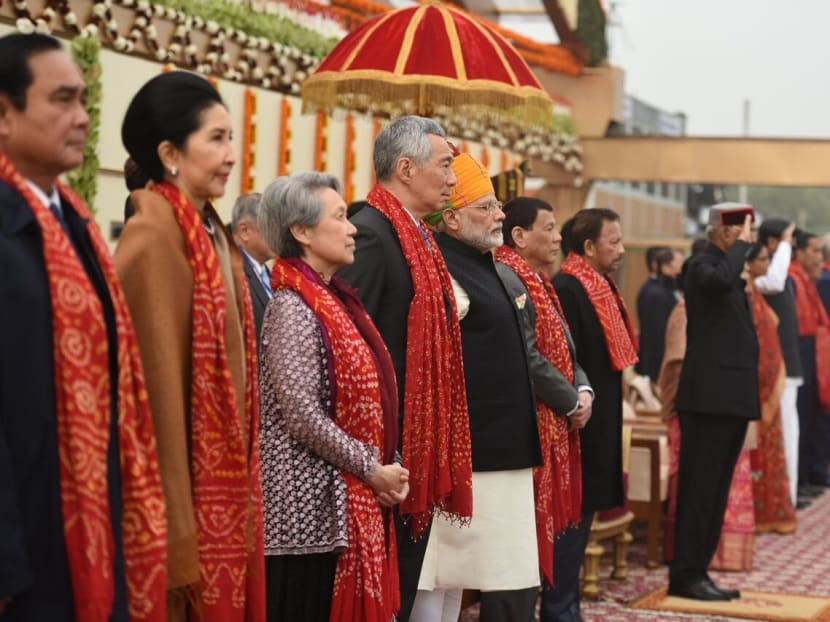Clear desire by India and Asean for RCEP talks to conclude this year: PM Lee
NEW DELHI — Both India and the Association of South-east Asian Nations (Asean) have shown a desire during summit talks this week to conclude negotiations for an ambitious free-trade agreement among 16 Asia-Pacific countries by this year, said Prime Minister Lee Hsien Loong.

PM Lee and other ASean leaders were chief guests of Mr Modi at India's Republic Day Parade on Friday (Jan 26). Photo: India's Ministry of External Affairs
NEW DELHI — Both India and the Association of South-east Asian Nations (Asean) have shown a desire during summit talks this week to conclude negotiations for an ambitious free-trade agreement among 16 Asia-Pacific countries by this year, said Prime Minister Lee Hsien Loong.
Speaking to Singapore reporters here on Friday (Jan 26) as he wrapped up his visit to attend a Asean-India commemorative summit, Mr Lee noted that all the Asean leaders “spoke forcefully” on the need for the Regional Comprehensive Economic Partnership (RCEP) to be agreed by the end of the year.
“Prime Minister (Narendra) Modi responded and says yes, India would like to do that too and they will exert efforts to come to that conclusion,” said Mr Lee.
“So I think the intentions are there to make it happen.”
Mr Lee was responding to a question on how Singapore, as the current Asean chair, will facilitate discussions on various regional cooperation initiatives with India, including RCEP.
“As Chairman, we are not the leader, we are sort of the coordinator. And as an honest broker-coordinator, we will bring Asean together and try and work out an arrangement and agreements which will command consensus,” said Mr Lee.
Negotiations for RCEP by the 10 Asean members and their six regional trading partners — Australia, China, South Korea, Japan, New Zealand and India - began in late 2012 but have taken longer than expected and missed three deadlines for a conclusion.
Part of the issue is that some of Asean’s dialogue partners, such as India and China, do not have free-trade agreements with each other.
Speaking at a summit plenary session on Thursday, Mr Lee had said that RCEP represents a “historic opportunity” to establish the world’s largest trade bloc, which will enable businesses to harness the region’s true potential.
“It could potentially transform the entire East Asian region into a single market,” said Mr Lee.
Asked by Singapore reporters on Friday how confident he was that a deal could be concluded this year, Mr Lee said: “I cannot say for sure that I’ll happen but I heard the leaders speaking yesterday and all of them expressed the right sentiments. So I think the desire to make it happen is there.”
He noted however that there was still a need by the countries involved to close “the gaps in perspectives and expectations.”
“Even in the goal for this agreement, what is it about?” he added, noting that in an economic trade agreement like RCEP, it is very seldom only about economics or trade.
“There’s always another aspect to it, of bilateral cooperation, of friendship, of strategic calculation, of what sort of framework you would like for the region to develop, for all the countries to be able to fit into,” he said.
“And I think we made this argument at the meeting yesterday. I made this argument that it’s not just an economic deal. Again there is a framework and I think RCEP brings the right partners in in Asia to the table,” he added.
“So I think the argument is appreciated but of course, we’ll have to work through domestic interest, you have to work through trade bureaucracies and your ministries and your other agencies, so I think there’s a lot of work.”
Mr Lee said that as Asean chair, Singapore would very much like to deepen the grouping’s cooperation with India.
On whether he had the sense from his visit to India this week that there can be substantive progress on this front, he said: “Progress in Asean is never overnight and in quantum leaps, it’s always gradual and incremental, and over time we hope that individual modest steps add up to something significant.
“And I think this trip would be in that nature, another step forward, valuable and positive, and we hope that we will build on it over time.”
This week’s summit marks the 25th anniversary of dialogue relations between Asean and India.
The 10 Asean leaders also attended India’s Republic Day parade on Friday as chief guests of Mr Modi.






